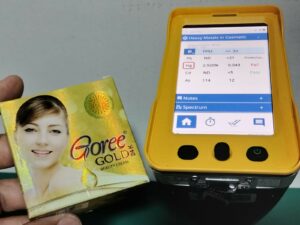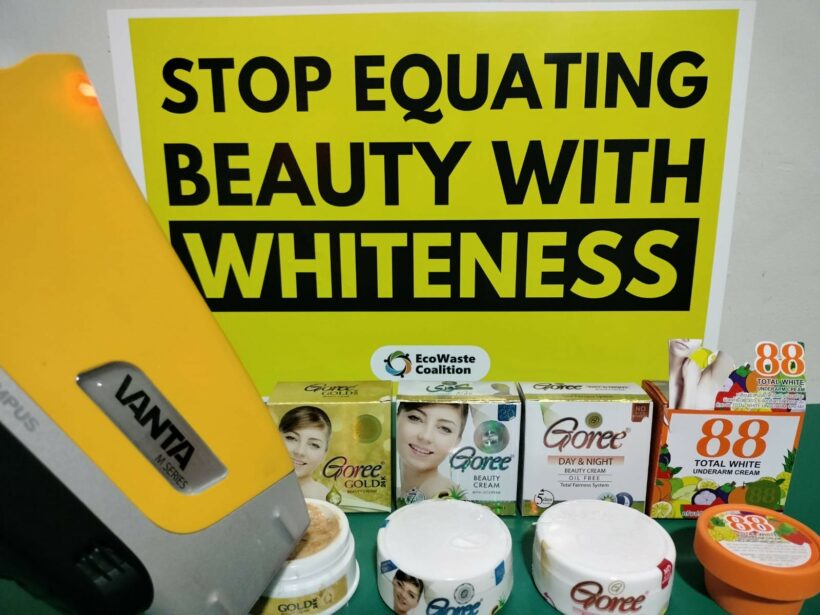21 January 2024, Quezon City. The toxics watchdog group EcoWaste Coalition criticized some beauty product stores in Quezon City for their flagrant violation of the ban on skin-lightening products containing mercury, a health-damaging chemical.
Despite the citywide ban adopted in 2018 through Ordinance No. 2767 ahead of the 2020 phase-out deadline for mercury-added cosmetics under the Minamata Convention on Mercury, some stores in Quezon City still sell imported skin whitening creams adulterated with mercury, the group said.
As part of its vigilant campaign to protect women and other vulnerable populations from mercury poisoning, the EcoWaste Coalition again visited retail hubs in Cubao, Novaliches, and Commonwealth on January 19 and 20 to check on store compliance with the mercury cosmetic ban.
Before this, the group on November 11, 26, and 27, 2023 monitored 28 retail stores selling skin-lightening products banned by the Food and Drug Administration (FDA) for containing mercury above the maximum limit of one part per million (ppm) and/or for lacking a valid certificate of product notification (CPN). The group promptly reported its findings to Quezon City Mayor Joy Belmonte and Dr. Ramona Asuncion Abarquez of the Quezon City Health Department (QCHD).
“Much to our disappointment, we found at least 10 stores still selling mercury-contaminated facial and underarm whitening creams from Pakistan and Thailand,” said Aileen Lucero, National Coordinator, EcoWaste Coalition. “This is despite the recent store inspections conducted by the QCHD in response to the complaints we lodged against the errant sellers.”
“We recognize and thank the QCHD for its efforts to get Ordinance 2767 implemented, and we request the Regional Enforcement Unit of the FDA to step in to assist QC and other local government units in curbing the unlawful trade of mercury-added cosmetics,” she said. Last January 15, the QC Government through the Business Permit and Licensing Department endorsed the complaints filed by the EcoWaste Coalition to the Office of FDA Director General Samuel Zacate “for information and proper disposition” as “the matter is within (his) authority.
To again demonstrate the toxicity of these products, the EcoWaste Coalition on January 20 purchased samples of skin-lightening products banned by the FDA for chemical screening.

Among the FDA-banned cosmetics obtained by the group and then screened for mercury were Goree Gold 24K Beauty Cream (bought for P200 from MC Skin Care at Murphy Public Market) Goree Day & Night Beauty Cream (P250, Red Coco, Farmers Plaza), Goree Beauty Cream with Lycopene (P170, David & Lyn, Commonwealth Market) and 88 Total White Underarm Cream (P280, Frelan Trading, Nova Plaza Mall).

Using a handheld Olympus Vanta M-Series X-Ray Fluorescence (XRF) analyzer, the group detected high concentrations of mercury in the analyzed creams: 29,200 ppm (Goree Gold 24 K Beauty Cream), 28,960 ppm (Goree Day & Night Beauty Cream), 28,150 ppm (Goree Beauty Cream with Lycopene), and 2,352 ppm (88 Total White Underarm Cream).
Added to cosmetics that are marketed to achieve a fairer and flawless skin complexion, mercury inhibits the body’s production of melanin causing the skin to appear whiter. People are exposed to mercury through dermal absorption, inhalation of mercury vapors, and ingestion.
Repeated exposure to mercury in skin lightening products can, in fact, result in skin discoloration, rashes and scarring, and reduced ability of the skin to resist bacterial and fungal infections. It can also damage the kidneys and the central nervous system causing anxiety, depression, hallucinations, personality changes, and tremors.
Aside from sustained law enforcement action by national and local government agencies, the EcoWaste Coalition is also urging the authorities to mount a “natural is beautiful” campaign to inculcate acceptance of one’s natural skin color among Filipinos and to refrain from using chemical whiteners to change one’s skin tone.
“Embracing our natural skin color is the easiest way to avoid mercury exposure via skin creams with undisclosed mercury content,” the group said. “We need to stop equating beauty with whiteness. Let’s say no to colorism.”






